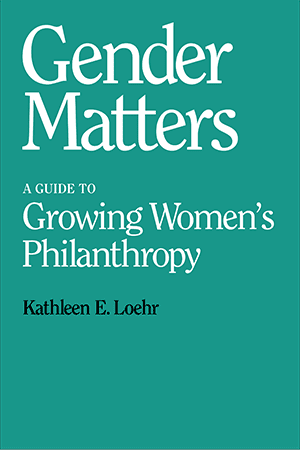Gender Matters
A Guide to Growing
Women’s Philanthropy
Research shows women are the drivers of their families’ philanthropic decisions. Women give more than men—and when they give, they give differently.
And yet, most nonprofits and educational institutions are still using tried and true fundraising practices that either alienate women or gain only minimal support from them. Better results are possible when fundraising methods adapt to the new donor realities.
In this book, Kathleen Loehr focuses on the specific individual, team and organizational adaptations necessary to increase philanthropic support from women. Loehr breaks through ingrained fundraising behaviors and blind spots that are preventing fundraising teams from reaching new levels of growth in women’s philanthropy. Designed as a catalyst for changing behavior, Loehr makes a compelling case that focusing on women donors gets results, and provides many specific adaptations for doing so.
Gender Matters
A Guide to Growing
Women’s Philanthropy
Research shows women are the drivers of their families’ philanthropic decisions. Women give more than men—and when they give, they give differently.
And yet, most nonprofits and educational institutions are still using tried and true fundraising practices that either alienate women or gain only minimal support from them. Better results are possible when fundraising methods adapt to the new donor realities.
In this book, Kathleen Loehr focuses on the specific individual, team and organizational adaptations necessary to increase philanthropic support from women. Loehr breaks through ingrained fundraising behaviors and blind spots that are preventing fundraising teams from reaching new levels of growth in women’s philanthropy. Designed as a catalyst for changing behavior, Loehr makes a compelling case that focusing on women donors gets results, and provides many specific adaptations for doing so.
Testimonials
The time for authentic data and direction on this topic is now; the book is here; it is called Gender Matters, and the person to tell this story is Kathleen Loehr. This treatment of this subject will guide professional and volunteer thinking on women in philanthropy for the coming decades and reflects Kathleen’s rich experiences in this arena. Read it for sure, but most vitally, put its wisdom into your planning. The results will speak for themselves because gender really does matter!
The time for authentic data and direction on this topic is now; the book is here; it is called Gender Matters, and the person to tell this story is Kathleen Loehr. This treatment of this subject will guide professional and volunteer thinking on women in philanthropy for the coming decades and reflects Kathleen’s rich experiences in this arena. Read it for sure, but most vitally, put its wisdom into your planning. The results will speak for themselves because gender really does matter!

